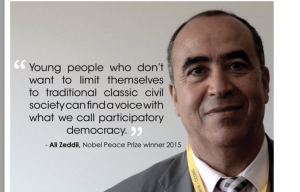. . DEMOCRATIC PARTICIPATION . .
An article by Civicus
BOGOTA, 25th April: Speaking at a press briefing to mark the opening of International Civil Society Week 2016, Nobel Prize winning Tunisian activist Ali Zeddini highlighted the role that civil society must play if there is to be sustainable peace in Colombia, Venezuela, Brazil and other Latin American countries.

Ali Zeddini
Click on photo to enlarge
‘From the political crises in Venezuela and Brazil to the Colombian peace negotiations, civil society must have a role in the whole peace process, before, during and after’, said Zeddini, who played a critical role in the peaceful revolution and democratic transition in Tunisia.
‘Civil society is the conscience of a people and as such must participate in the defence of the people’s interests,’ added Zeddini. “Tunisia’s example shows that organised civil society can provide education and support to move away from violence and this can inspire other countries.’
Liliana Patricia Rodriguez Burgos, Executive Director of Confederación Colombiana de ONG (CCONG), the Colombian host organisation for ICSW 2016 welcomed Zeddini and civil society leaders, including Danny Sriskandarajah, Secretary General of CIVICUS, the co-organisers of the conference.
#ICSW2016 is the largest and most diverse gathering of its kind with over 900 leading activists, thinkers and media from 109 countries meeting this week to celebrate the power of people and movements to fight human rights, democracy and development struggles.
(Article continued in right column)
How can we develop the institutional framework for a culture of peace?
(Article continued from left column)
Venezuelan constitutional legal expert and LGBTI activist Tamara Adrián praised the role that civil society plays saying, ‘In Venezuela there are no government numbers on violence, teenage pregnancy, access to medicine, and how many people go hungry. NGOs and academics provide research and raise awareness on these key issues’.
The gathering happens against the backdrop of a global repressive trend of increased attacks on the people and organisations that defend our basic human rights.
‘Civil society is facing a global crisis’, said Sriskandarajah, ‘CIVICUS is tracking serious human rights violations in 101 countries, from dictatorships to democracies. Politicians fear dissenting voices. Anti-terrorism measures and the notion of insecurity are being used to shut down citizen action. Political and economic inequality are on the rise. From activists to social movements, lawyers to media, now more than ever we need civil society to stand together in solidarity against a global tide of government repression.’
Amongst the most brutal examples of repressive acts are the harassment, physical violence and targeted killings of human rights defenders, human rights lawyers and journalists, which continue to increase. In 2015 alone, 156 human rights defenders lost their lives and the murders of Berta Cáceres and her fellow activist Nelson García in Honduras in March highlighted again the on-going crisis.
In Latin America land, environmental, and indigenous rights activists are being specifically targeted as mines, agribusiness and megaprojects such as dams are being pushed through in countries including Brazil, Colombia, Guatemala, Honduras, Mexico, Paraguay and Peru.